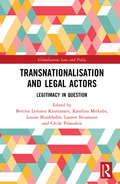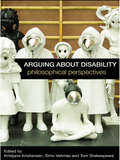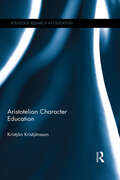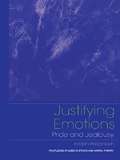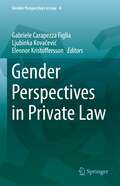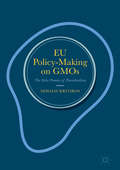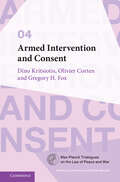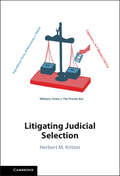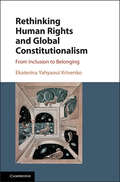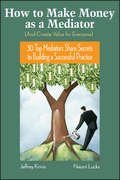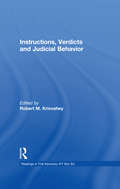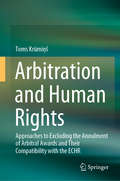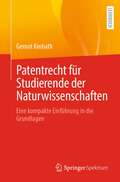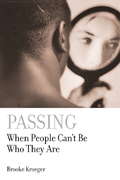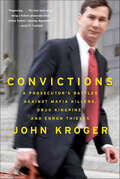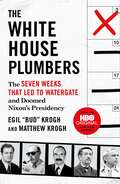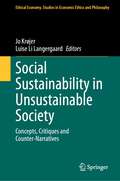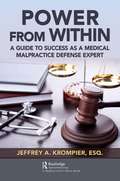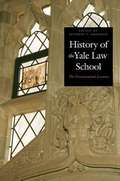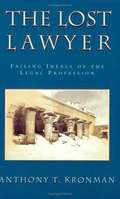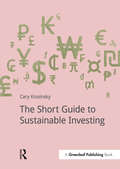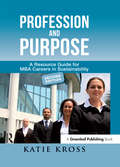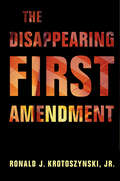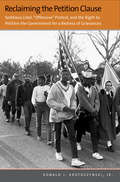- Table View
- List View
Transnationalisation and Legal Actors: Legitimacy in Question (Globalization: Law and Policy)
by Bettina Lemann Kristiansen Cécile Pelaudeix Katerina Mitkidis Lauren Neumann Louise MunkholmTransnational tendencies have led to a pluralistic legal environment in which emerging and established legal actors, regulatory levels and types of legal norms co-exist, compete and interact in complex ways. This challenges and changes not only how legal norms are created, applied and enforced but also when these actors, norms and processes are considered legitimate. The book investigates how states and non-state actors interact in transnational settings and pays attention to the understudied question of what effect transnational tendencies have on the legitimacy of legal actors, norms and processes. It seeks to confront three fundamental questions: Has legitimacy significantly changed? Who creates norms and with which consequences for legal procedures and norms? The book considers the question of legitimacy from a broad range of legal perspectives, including environmental law, human rights law and commercial law. It maps out the contours of legitimacy today with an emphasis on the reactions of central actors like states and courts to transnational tendencies. The book thereby provides a conceptually powerful structure within which to further debate the complexity of transnational tendencies in law and proposes innovative approaches to problem solving while designing pathways for further reflection on the development of law in a transnational context.
Arguing about Disability: Philosophical Perspectives
by Kristjana Kristiansen Simo Vehmas Tom ShakespeareDisability is a thorny and muddled concept - especially in the field of disability studies - and social accounts contest with more traditional biologically based approaches in highly politicized debates. Sustained theoretical scrutiny has sometimes been lost amongst the controversy and philosophical issues have often been overlooked in favour of the sociological. Arguing about Disability fills that gap by offering analysis and debate concerning the moral nature of institutions, policy and practice, and their significance for disabled people and society. This pioneering collection is divided into three sections covering definitions and theories of disability; disabled people in society and applied ethics. Each contributor – drawn from a wide range of academic backgrounds including disability studies, sociology, psychology, education, philosophy, law and health science – uses a philosophical framework to explore a central issue in disability studies. The issues discussed include personhood, disability as a phenomenon, social justice, discrimination and inclusion. Providing an overview of the intersection of disability studies and philosophical ethics, Arguing about Disability is a truly interdisciplinary undertaking. It will be invaluable for all academics and students with an interest in disability studies or applied ethics, as well as disability activists.
Aristotelian Character Education (Routledge Research in Education)
by Kristján KristjánssonThis book provides a reconstruction of Aristotelian character education, shedding new light on what moral character really is, and how it can be highlighted, measured, nurtured and taught in current schooling. Arguing that many recent approaches to character education understand character in exclusively amoral, instrumentalist terms, Kristjánsson proposes a coherent, plausible and up-to-date concept, retaining the overall structure of Aristotelian character education.After discussing and debunking popular myths about Aristotelian character education, subsequent chapters focus on the practical ramifications and methodologies of character education. These include measuring virtue and morality, asking whether Aristotelian character education can salvage the effects of bad upbringing, and considering implications for teacher training and classroom practice. The book rejuvenates time-honoured principles of the development of virtues in young people, at a time when ‘character’ features prominently in educational agendas and parental concerns over school education systems.Offering an interdisciplinary perspective which draws from the disciplines of education, psychology, philosophy and sociology, this book will appeal to researchers, academics and students wanting a greater insight into character education.
Justifying Emotions: Pride and Jealousy (Routledge Studies in Ethics and Moral Theory)
by Kristjan KristjanssonThe two central emotions of pride and jealousy have long been held to have no role in moral judgements, and have been a source of controversy in both ethics and moral psychology. Kristjan Kristjansson challenges this common view and argues that emotions are central to moral excellence and that both pride and jealousy are indeed ingredients of a well-rounded virtuous life.
Gender Perspectives in Private Law (Gender Perspectives in Law #4)
by Eleonor Kristoffersson Gabriele Carapezza Figlia Ljubinka KovačevićThis book discusses prominent and controversial gender-related issues across the fields of family law, tort law, labour law, civil procedure law, ADR and private international law. An important critical assumption made by the authors is that the gender equality perspective has been largely neglected in several branches of private law, since scholars researching the intersection between gender and legal studies are mostly focused on public law and human rights law. In light of that, the book contributes not only to the deconstruction of gender-blind private law, but also to the development of a gender-competent analysis of the key branches of private law, starting with private international law. Gender perspective in family law is analyzed on the basis of gendered and heteronormative operations of family law with reference to the formation of legally recognized relationships, the establishment of legal parenthood, the division of marital property after a divorce, and the arrangements for post-separation parenting. Also, regulation of family matters in Indian society and the gender equality perspective from the principle of the child’s best interest are considered. As far as tort law is concerned, the book addresses compensation for damages suffered by women performing unpaid household work. Further, it contains papers dedicated to the following labour law issues: the genesis of labor law and its capacity to contribute either to worsening gender inequality in the world of work or to promoting gender equality; gender segregation in the labour market and its connection to family-friendly policies in the European Union; sexual harassment at work; and the impact of work digitalization on gender-related labour law issues. Lastly, the authors analyze gender equality in civil procedural law, as well as in mediation as a tool for encouraging the peaceful settlement of disputes. The book is intended to improve awareness of the wide range of private law issues that are important for understanding the ways in which gender inequality shapes everyday experiences, while also presenting critical considerations of the key private law instruments for achieving gender equality.
EU Policy-Making on GMOs
by Mihalis KritikosThis book examines the development and implementation of the EU's legislative framework on the commercial release of GMO products as a case study of social regulation operating within a predominantly technical framework. The analysis and findings are based on an extensive documentary analysis and interviews with regulators, risk assessors, public interest groups and biotechnology experts at the national and European levels. It argues that in the case of the EU biotechnology framework, the particular institutional settings created for the formulation and interpretation of its provisions have been of decisive importance in elaborating a proceduralised 'science-based' prior authorization scheme as the preferred framework for granting commercial permits. This interdisciplinary work will appeal to EU lawyers, decision-makers and risk managers as well as academics working in the fields of EU studies, politics, law, risk governance sociology of science/risk and technology assessment. The book is based on a PhD thesis that was awarded with the 2008 UACES Prize for the Best Thesis in European Studies in Europe and with the EPEES 1st Prize for the Best Thesis written by a Greek Researcher between 2004 and 2008.
Armed Intervention and Consent (Max Planck Trialogues #4)
by Dino Kritsiotis Olivier Corten Gregory H. FoxIn the past decade, numerous military operations by outside states have relied on the real or alleged 'invitation' of one of the parties. In this book, three experts examine the relevant legal issues, from sovereignty to the scope and relevance of consent, the use of force to the role of the Security of Council. Using critical historical analysis, qualitative case studies and large-N empirics, these topics are debated and addressed in a unique trialogue format. Accommodating the pluralism of the field, the trialogical setting highlights the divergences and commonalities of each of the three approaches. Benefiting from an in-depth analysis of recent cases of armed intervention and the diversity of the authors' perspectives, this collection is key to developing a richer understanding of the law of military intervention. This title is also available as Open Access on Cambridge Core.
Justices on the Ballot
by Herbert M. KritzerJustices on the Ballot addresses two central questions in the study of judicial elections: how have state supreme court elections changed since World War II? And, what effects have those changes had on election outcomes, state supreme court decisions, and the public's view of the courts? To answer these questions, Herbert M. Kritzer takes the broadest scope of any study to date, investigating every state supreme court election between 1946 and 2013. Through an analysis of voting returns, campaign contributions and expenditures, television advertising, and illustrative case studies, he shows that elections have become less politicized than commonly believed. Rather, the changes that have occurred reflect broader trends in American politics, as well as increased involvement of state supreme courts in hot-button issues.
Litigating Judicial Selection
by null Herbert M. KritzerIn the United States and elsewhere, the questions of who should serve as a judge and how these judges should be chosen are increasingly contested. In Litigating Judicial Selection, Herbert Kritzer examines these questions with a comprehensive analysis of judicial-selection litigation over time and place. With a data set of over 2,000 cases from around the world, Kritzer offers new insight into the judicial selection by way of in-depth statistical analysis and an extensive narrative description of several important case studies. This book should be read by anyone seeking insight into the way judges are selected in the twenty-first century.
Rethinking Human Rights and Global Constitutionalism: From Inclusion to Belonging
by Krivenko Ekaterina YahyaouiAre human rights really a building block of global constitutionalism? Does global constitutionalism have any future in the theory and practice of international law and global governance? This book critically examines these key questions by focusing on the mechanisms utilised by global constitutionalism whilst comparing the historical functioning of constitutional rights in national systems. Yahyaoui Krivenko provides new insights into the workings of human rights and associated notions, such as the state, the political, and the individual, by demonstrating that human rights are antithetical to global constitutionalism and encouraging new discussions on the meaning of global constitutionalism and human rights. Drawing on the interdisciplinary works of such thinkers as Agamben, Luhmann, Bourdieu, Deleuze and Guattari, this book also considers practical examples from historical experience of ancient Greek and early Islamic societies. It will appeal to scholars interested in human rights, international law and critical legal theory.
How To Make Money as a Mediator (And Create Value for Everyone)
by Jeffrey Krivis Naomi LucksHow to Make Money as a Mediator (and Create Value for Everyone) is an invaluable and inspirational resource filled with practical, proven, and down-to-earth information on how you can develop a satisfying and lucrative career as a mediator, no matter what your area of interest--labor and employment mediation, intellectual property, environment, personal injury, family and divorce, contract, securities, or international peacekeeping.
Instructions, Verdicts, and Judicial Behavior (Readings in Trial Advocacy A/T Soc Sci #Vol. 4)
by Robert M. KrivosheyFirst Published in 1994. Volume 4 in the 4-volume anthology of scholarly articles titled Readings in Trial Advocacy and the Social Sciences; a series seeking to increase our understanding of courtroom dynamics. This fourth volume consists of six jury instructions, six verdicts and two articles on judicial behaviour. These collection raises issues ranging from ability of jurors to understand judicial instructions to the ability of attorneys to predict the outcome of pending litigation.
Arbitration and Human Rights: Approaches to Excluding the Annulment of Arbitral Awards and Their Compatibility with the ECHR
by Toms KrūmiņšThis book presents a creative synthesis of two ostensibly disparate fields of law – arbitration and human rights. More specifically, it focuses on various legislative approaches to excluding the annulment of arbitral awards (setting-aside proceedings) at the seat of arbitration and evaluates the compatibility of such approaches with the European Convention on Human Rights (ECHR), in particular the right to a fair trial under Article 6(1). The book first assesses the applicability and impact of the ECHR, in particular Article 6(1), on international commercial arbitration. It then analyses a number of legislative approaches to excluding setting-aside proceedings, focusing on two synergetic phenomena – exclusion agreements and the total lack of setting-aside proceedings in national arbitration law. Lastly, the book investigates to what extent the lack of setting-aside proceedings in national arbitration law may lead to a violation of arbitrating parties’ right to a fair trial under Article 6(1), and puts forward certain de lege ferenda recommendations on how to best approach the regulation of setting-aside proceedings in national arbitration law from the standpoint of compliance with the ECHR.
Patentrecht für Studierende der Naturwissenschaften: Eine kompakte Einführung in die Grundlagen
by Gernot KrobathDieses Lehrbuch bietet einen kompakten Einstieg in das Patentrecht für Studierende der Naturwissenschaften. Es präsentiert das wesentliche Grundwissen zum deutschen und europäischen Patentrecht. Dabei vertieft sich das Buch bewusst nicht in selten auftretende Spezialfälle oder juristische Feinheiten, sondern es ermöglicht den Lesern, ein Grundverständnis für die zentralen Begriffe und Grundprinzipien des Patentrechts zu entwickeln. Das Lehrbuch enthält zahlreiche Kurzbeispiele und Fallfragen mit Lösungen, anhand derer der Leser die Inhalte verstehen und nachvollziehen kann.
Passing: When People Can't Be Who They Are
by Brooke KroegerThrough the provocative stories of six contemporary passers, and examples from history and literature, a renowned journalist illuminates passing as a strategy for bypassing prejudice and injustice
Convictions: A Prosecutor's Battles Against Mafia Killers, Drug Kingpins, and Enron Thieves
by John KrogerConvictions is a spellbinding story from the front lines of the fight against crime. Most Americans know little about the work of assistant United States attorneys, the federal prosecutors who possess sweeping authority to investigate and prosecute the nation's most dangerous criminals. John Kroger pursued high-profile cases against Mafia killers, drug kingpins, and Enron executives. Starting from his time as a green recruit and ending at the peak of his career, he steers us through the complexities of life as a prosecutor, where the battle in the courtroom is only the culmination of long and intricate investigative work. He reveals how to flip a perp, how to conduct a cross, how to work an informant, how to placate a hostile judge. Kroger relates it all with a novelist's eye for detail and a powerful sense of the ethical conflicts he faces. Often dissatisfied with the system, he explains why our law enforcement policies frequently fail in critical areas like drug enforcement and white-collar crime. He proposes new ways in which we can fight crime more effectively, empowering citizens to pressure their lawmakers to adopt more productive policies. This is an unflinching portrait of a crucial but little-understood part of our justice system, and Kroger is an eloquent guide.
The White House Plumbers: The Seven Weeks That Led to Watergate and Doomed Nixon's Presidency
by Egil "Bud" Krogh Matthew KroghSOON TO BE A FIVE-PART HBO SERIES, STARRING WOODY HARRELSON AND JUSTIN THEROUXThe true story of The White House Plumbers, a secret unit inside Nixon's White House, and their ill-conceived plans stop the leaking of the Pentagon Papers, and how they led to Watergate and the President's demise.On July 17, 1971, Egil “Bud” Krogh was summoned to a closed-door meeting by his mentor—and a key confidant of the president—John Ehrlichman. Expecting to discuss the most recent drug control program launched in Vietnam, Krogh was shocked when Ehrlichman handed him a file and the responsibility for the Special Investigations Unit, or SIU, later to be notoriously known as “The Plumbers.”The Plumbers’ work, according to Nixon, was critical to national security: they were to investigate the leaks of top secret government documents, including the Pentagon Papers, to the press. Driven by blind loyalty, diligence, and dedication, Krogh, along with his co-director, David Young, set out to handle the job, eventually hiring G. Gordon Liddy and E. Howard Hunt, who would lead the break-in to the office of Dr. Fielding, a psychiatrist treating Daniel Ellsberg, the man they suspected was doing the leaking. Krogh had no idea that his decisions would soon lead to one of the most famous conspiracies in presidential history and the demise of the Nixon administration.The White House Plumbers is Krogh’s account of what really happened behind the closed doors of the Nixon White House, and how a good man can make bad decisions, and the redemptive power of integrity. Including the story of how Krogh served time and later rebuilt his life, The White House Plumbers is gripping, thoughtful, and a cautionary tale of placing loyalty over principle.
Social Sustainability in Unsustainable Society: Concepts, Critiques and Counter-Narratives (Ethical Economy #67)
by Jo Krøjer Luise Li LangergaardThis book offers a unique, critical exploration of concepts and practices of social sustainability through both a critical concept analysis as well as empirical studies of practices that undermine social sustainability. It addresses the questions: What is the main role of social relations and social practice in the transition from fundamentally unsustainable societies and local practices towards a sustainable future? And how does economical sustainability reduce or enhance social sustainability? The chapters in this work define and understand social sustainability in relation to principles such as solidarity, community, welfare, reciprocity, and regenerative co-existence. These principles are analyzed through the lens of emotions, respect, carefulness, sensitivity, and art, to establish counter-principles and narratives to principles like growth, efficiency, capitalism, and mastery of nature. Such counter-narratives to mainstream understandings and histories of economy aid in shedding light on a variety of different aspects of sustainability. The book presents a methodological plurality including conceptual and empirical approaches, praxis-oriented and inductive approaches. The chapters present interdisciplinary approaches concerning welfare, ecology, sociology, organization and economy, social psychology and aesthetics and therefore appeal to a broad audience of scholars and academics.
Power from Within: A Guide to Success as a Medical Malpractice Defense Expert
by Jeffrey A. Krompier, Esq.There is no end in sight to the frequency with which physicians, nursing professionals and other healthcare providers will become lawsuit targets in our litigious society. While politicians, practitioners, insurance companies and trial attorneys debate the nation’s chronic "malpractice crisis", suits continue to be filed. In addition, once COVID-19 is behind us and the unprecedented public support for health care providers wanes, as it will, it is anticipated that physicians and nurses will become malpractice defendants to a remarkable degree. National legislative fact-finding committees and investigative bodies, which may be charged with the responsibility of pursuing a solution, likely will never achieve a global remedy. Although curtailed by some states, national legislation has not addressed baseless malpractice suites or grossly excessive monetary verdicts. Another approach exists, however. Health care providers can impact the existing system and influence the malpractice environments in a tangible, positive and powerful fashion. Although there will be debate over tort reform in order to bring some degree of protection to the malpractice defendant, individual case success, defined from the defendant’s perspective as a "no-cause" trial verdict, can be realized if well-credentialed and experienced health care professionals are willing to assist the malpractice defense bar as expert witnesses. The benefits to the health care community and the individuals who are willing to participate are innumerable and worth considering.
A History of the Yale Law School: The Tercentennial Lectures
by Anthony T. KronmanA fascinating examination of the history of the Yale Law School and its impact on the development of legal education in the U. S. The entity that became the Yale Law School started life early in the nineteenth century as a proprietary school, operated as a sideline by a couple of New Haven lawyers. The New Haven school affiliated with Yale in the 1820s, but it remained so frail that in 1845 and again in 1869 the University seriously considered closing it down. From these humble origins, the Yale Law School went on to become the most influential of American law schools. In the later nineteenth century the School instigated the multidisciplinary approach to law that has subsequently won nearly universal acceptance. In the 1930s the Yale Law School became the center of the jurisprudential movement known as legal realism, which has ever since shaped American law. In the second half of the twentieth century Yale brought the study of constitutional and international law to prominence, overcoming the emphasis on private law that had dominated American law schools. By the end of the twentieth century, Yale was widely acknowledged as the nation's leading law school. The essays in this collection trace these notable developments. They originated as a lecture series convened to commemorate the tercentenary of Yale University. A distinguished group of scholars assembled to explore the history of the School from the earliest days down to modern times. This volume preserves the highly readable format of the original lectures, supported with full scholarly citations.
The Lost Lawyer: Failing Ideals of the Legal Profession
by Anthony T. KronmanAnthony Kronman describes a spiritual crisis affecting the American legal profession, and attributes it to the collapse of what he calls the ideal of the lawyer-statesman: a set of values that prizes good judgment above technical competence and encourages a public-spirited devotion to the law. <p><p> For nearly two centuries, Kronman argues, the aspirations of American lawyers were shaped by their allegiance to a distinctive ideal of professional excellence. In the last generation, however, this ideal has failed, undermining the identity of lawyers as a group and making it unclear to those in the profession what it means for them personally to have chosen a life in the law. <p> A variety of factors have contributed to the declining prestige of prudence and public-spiritedness within the legal profession. Partly, Kronman asserts, it is the result of the triumph, in legal thought, of a counterideal that denigrates the importance of wisdom and character as professional virtues. Partly, it is due to an array of institutional forces, including the explosive growth of the country's leading law firms and the bureaucratization of our courts. The Lost Lawyer examines each of these developments and illuminates their common tendency to compromise the values from which the ideal of the lawyer-statesman draws strength. It is the most important critique of the American legal profession in some time, and an an enduring restatement of its ideals.
The Short Guide to Sustainable Investing (Doshorts Ser.)
by Cary KrosinskyThe vast majority of invested assets do not consider environmental, social or governance (ESG) factors. Socially responsible investing (SRI) emerged to address these challenges, but it remains largely deployed in "negative strategies" such as sector screening, and continues to be a small investment niche, largely due to perceptions about potential underperformance.Sustainable investing is a new, more positive investment construct, described as "an investment discipline that explicitly considers future social and environmental trends in financial decision making, in order to provide the best risk-adjusted and opportunity-directed returns for investors. By anticipating these trends ahead of the market, sustainable investing seeks to identify 'predictable surprises' that can help maximize value over the long term."This concise guide by one of the sector's leading experts: Disentangles the terminology around SRI and describes a new, positive, opportunities-oriented paradigm for sustainable investing Showcases funds and strategies that are delivering outperformance within ecological limitsSets out the key megatrends and scenarios which investors need to consider, and Offers a practical guide to constructing a sustainable portfolio. This is absolutely essential reading for investors, fund managers and analysts who need to get up to speed on sustainable investing.
Profession and Purpose: A Resource Guide for MBA Careers in Sustainability
by Katie KrossSustainability holds the promise of an exciting new approach to business – one in which business goals are aligned with social and environmental goals. Multinational corporations are recognizing that we live in an increasingly resource-constrained world, and that more accountability for corporate social and environmental impacts will accrue to them. More importantly, forward-thinking executives understand that sustainability can present new opportunities for competitive advantage – whether that is by reducing costs, minimizing risk, appealing to increasingly conscientious customers, or reaching new markets entirely.With the growth of this field comes a host of interesting new career opportunities for MBAs. As companies are grappling with challenges like how to develop social return on investment (SROI) metrics or understand the potential impact of corporate carbon footprints on stock prices, there are new opportunities for the next generation of managers – managers who are not only trained in traditional MBA fundamentals but also grounded in an understanding of the multifaceted social and environmental challenges facing 21st-century global business leaders. Entirely new career paths are opening to MBAs interested in sustainability: sustainable venture capital, green marketing, corporate social responsibility management, carbon credit trading, and sustainability consulting, to name a few.Perhaps even more than corporate executives, MBA students understand this trend. The next generation of managers can see that the future of business will require a new set of skills and responsibilities. Between 2003 and 2008, membership in Net Impact, the global organization for MBAs and business professionals interested in sustainability, increased more than fourfold. By March 2009, over 130 business schools had a Net Impact chapter. Around the world, MBA students realize that a different model will be required for businesses in the coming decades. The career paths that fall under the broad umbrella of "sustainability" are as diverse as the MBA students themselves. One student may be interested in social entrepreneurship in West Africa, and the next will be seeking advice about clean-tech venture capital careers in Silicon Valley; a third will be interested in greening global supply chains. Corporate social responsibility, sustainable product marketing, microfinance, green real estate development, renewable energy, and other interests all likewise fall under the sustainability umbrella at times. Because of this diversity, it is often hard for business schools' career management centers to address sustainability-related career options in a comprehensive way. Many sustainability-related companies and nonprofits are not accustomed to on-campus recruiting. Others have not historically hired MBAs at all. MBA students and alumni interested in sustainability careers are often left to navigate their own internship and job search paths. And, often, they struggle. Profession and Purpose has been written to address this urgent need. Whether you are focused on an off-campus search or participating in the on-campus recruiting process, there are a host of sustainability-specific career resources you should know about. You'll need to be well versed in sustainability news and trends, and network at the right events, conferences, and company presentations. You also need to know about industry- and discipline-specific websites that post sustainability jobs for positions with titles like Corporate Social Responsibility Manager, Socially Responsible Investing Analyst, and Renewable Energy Market Analyst.Through hundreds of conversations with MBA students, professionals, and recruiters, as well as her own personal experience, the author has compiled the key job search resources and tips for MBAs interested in sustainability careers. The book provides ideas for researching companies, making the most of your networking, identifying job and internship openings, and preparing for interviews. No matter what stage of your MBA career search process you're in, this
The Disappearing First Amendment
by Ronald J. Krotoszynski, Jr.The standard account of the First Amendment presupposes that the Supreme Court has consistently expanded the scope of free speech rights over time. This account holds true in some areas, but not in others. In this illuminating work, Ronald J. Krotoszynski, Jr acknowledges that the contemporary Supreme Court rigorously enforces the rules against content and viewpoint discrimination for those who possess the wherewithal to speak but when citizens need the government's assistance to speak - for example, access to public property for protest - free speech rights have declined. Instead of using open-ended balancing tests, the Roberts and Rehnquist Courts have opted for bright line, categorical rules that minimize judicial discretion. Opportunities for democratic engagement could be enhanced, however, if the federal courts returned to the Warren Court's balancing approach and vested federal judges with discretionary authority to require government to assist would-be speakers. This book should be read by anyone concerned with free speech and its place in democratic self-government.
Reclaiming the Petition Clause: Seditious Libel, "Offensive" Protest, and the Right to Petition the Government for a Redress of Grievances
by Ronald J. KrotoszynskiSince the 2004 presidential campaign, when the Bush presidential advance team prevented anyone who seemed unsympathetic to their candidate from attending his ostensibly public appearances, it has become commonplace for law enforcement officers and political event sponsors to classify ordinary expressions of dissent as security threats and to try to keep officeholders as far removed from possible protest as they can. Thus without formally limiting free speech the government places arbitrary restrictions on how, when, and where such speech may occur.
